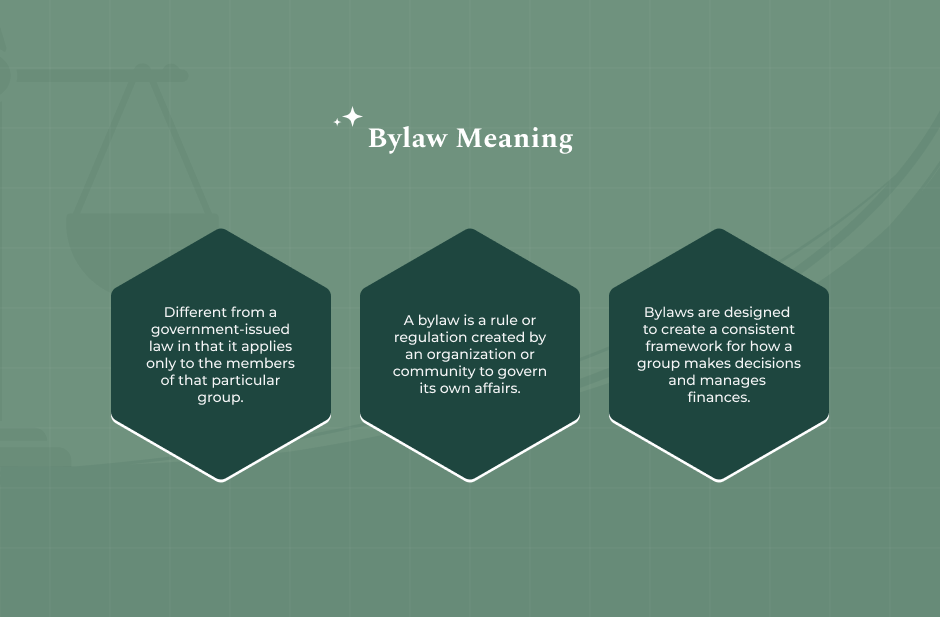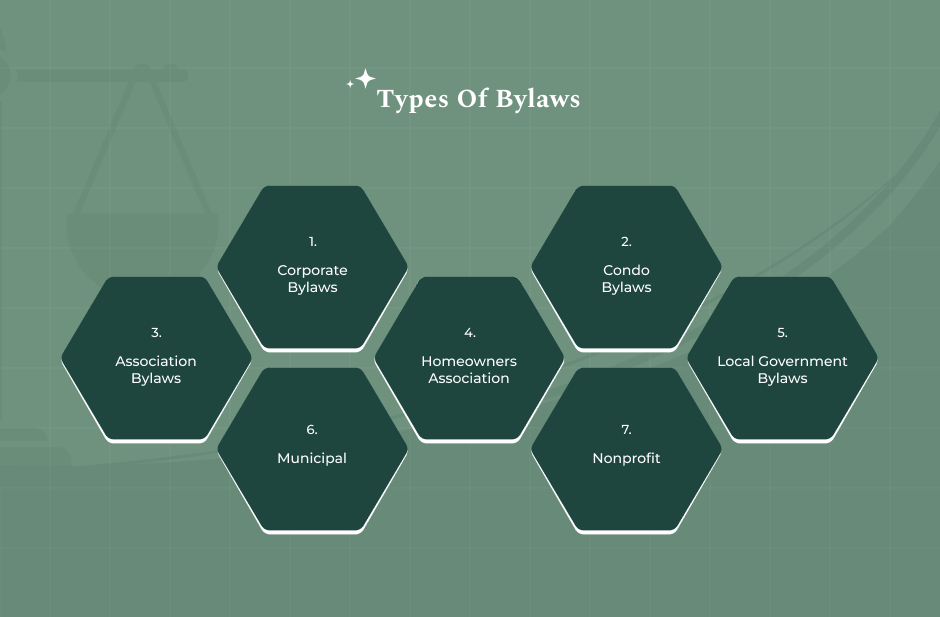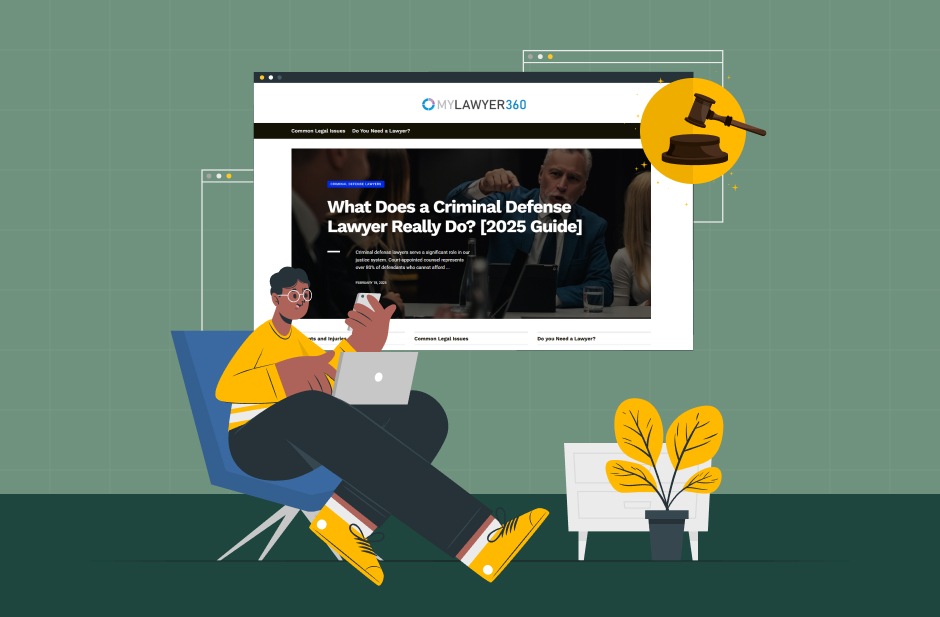Knowing what are bylaws is important. Yes, it matters to one and all, part of any organization. So, if it is a small local non-profit company or a money-making huge corporation. Thus, Bylaws are important for any such citizen who fall under the purview of a local government.
- Essentials of Bylaws
- Bylaws are a set of rules.
- They guide the activities of an entity.
- Lastly, these rules are self-enacted by the entity.
Additionally, Bylaws do not apply to regions where a higher legal power exists.
The higher legal power in context is the state law, regional law and even the constitution.
So, what exactly are bylaws? They are the guidebook for how an organization actually operates on a daily basis. According to Kansas University’s The Community Tool Box:
“Bylaws are the written rules that control the internal affairs of an organization. Bylaws generally define things like the group’s official name, purpose, requirements for membership, officers’ titles and responsibilities, how offices are to be assigned, how meetings should be conducted, and how often meetings will be held.
Bylaws also govern the way the group must function as well as the roles and responsibilities of its officers. They are essential in helping an organization map out its purpose and the practical day-to-day details of how it will go about its business. Bylaws serve as the legal guidelines of the organization, and the organization could be challenged in court for its actions if it violates them.”
Why Bylaws Matters?
Why does any organization need a code of rules? What are corporate bylaws? Why does a for-profit company need them? And, why does a non-profit organization need bylaws even?
Let’s begin to answer all of these questions for you.
Well, without clear direction, decision-making quickly breaks down into chaos and conflict. So, what are bylaws is basically a question about governance.
Bylaws enforce order in any organization that adopts them. They establish equality, consistency, and openness in all processes. Moreover, shareholders, employees, members, and citizens- each one’s rights are well protected by the bylaws.
Thus, we understand that the creation of Bylaws and their maintenance are legally essential for organizations.
What Is A Bylaw? Definition & Legal Nature

A bylaw is basically a local or limited form of law. Like other State or Federal Laws, they are not sovereign. Powers of a bylaw are mostly a delegated form of state law.
Kinds of Bylaws
Let us look into the various forms of Bylaws and understand how they differ from one another.
1. Organizational Bylaws
These mostly govern a non-profit or corporation. So, what are bylaws, when it comes to NGOs? What are corporate bylaws?
Bylaws are the laws and rules that the members, directors, or even founders follow. According to Wolters Kluwer, they use them to govern affairs, business, and the workings of the company.
Importantly, all bylaws have to stand in accordance with the statutory laws of the state in which they exist. Ideally, you will find these bylaws listed in the principal charter of the company, like the Articles of Incorporation.
2. Municipal Bylaws
What are bylaws in a municipal government? They are legislative directives made by a municipal council.
Prince Edward Island Government states that, mostly, Bylaws receive their authority from state municipal legislation or provincial laws.
This way, municipal governments have power over matters such as noise control, zoning, traffic, and even public health.
Thus, either way, a bylaw is always a delegated form of already existing superior law. In case the bylaw lies in contravention of this superior law, it becomes invalid, or as the legal jargon goes, “ultra vires.”
According to Archives.gov, the said superior law can either be a state law or the father of all laws, the U.S. Constitution itself.
Types & Applications of Bylaws

“What are bylaws” has a few answers depending on the organization. Let’s find them out, shall we?
Corporate Bylaws
These are the ones that govern internal management of a for-profit corporation. Think shareholder rights, board elections, and officer duties, corporate bylaws cover them all.
Nonprofit/Association Bylaws
Association bylaws govern charities, trade associations, and civic organizations. Thus, they deal with the mission statement, membership classifications, dues, and process of dissolution.
Municipal/Local Government Bylaws
These are municipal bylaws that the police or specially hired bylaw officers can enforce. So, some good examples of these include parking bylaws, laws regarding pet registration, and even building permits.
HOA/Condo Bylaws
Condo Bylaws are ones that govern planned communities, much like condominium corporations. These are the rules governing common areas, the appearance, and maintenance fees.
Bylaws vs. Other Legal Instruments
After going through it all, Stripe mentions, it is safe to say that bylaws are actually an operations manual that works in compliance with higher-level laws.
1. Articles of Incorporation (or Charter)
This is the public document filed in front of the state government to legally establish the corporation, as per Thomas Reuters.
Relationship
The bylaws of the corporation should exist in coherence with the Articles. In case of conflict, then Articles of Incorporation will always prevail.
2. Operating Agreements (for LLCs)
These agreements are all contracts that govern a Limited Liability Company (LLC).
Relationship
In an LLC, the Operating Agreement is the one that governs and oversees the functional role of all the corporate bylaws. Thus, they are the ones who govern voting and management, as well.
3. Statutes and Acts (State/Federal Law)
As we already know, Acts and Statutes are laws that get their power through enactment by state legislatures or the U.S. Congress.
This is the ultimate authority. Whatever are bylaws trying to control, they have to be consistent with all federal and state legislation. If a bylaw is in conflict with a statute, the statute always prevails.
Core Provisions & Structure of Bylaws
When writing the internal rules, what are bylaws of a corporation typically include provisions that mirror the underlying organization’s structure.
Meetings
Annual and special meeting rules, notice, and location. Moreover, they also describe how to dispense with a meeting.
Quorum and Voting
The number of directors or shareholders who must attend to legally transact affairs. Moreover, they also deal with the minimum margin necessary to vote.
Board of Directors
Establishes the number of directors, their qualifications, term of office, etc. Moreover, they also decide on the election process, removal, and vacancy-filling procedures.
Defines the major officer positions (President, Treasurer, Secretary), their duties, and powers. Moreover, they also decide the compensation policy.
Indemnification
These usually deal with provisions for the way the organization protects directors and officers. Therefore, these members protect against personal liability for their corporate service while also going through reasonable limitations.
Amendment
Notably, the document of the bylaw should lay down the procedure by which the bylaw itself can be amended.
Judicial Review & Legal Challenges In The US
US courts, and particularly those in Delaware, where most large publicly traded companies are incorporated, scrutinize corporate bylaws on a regular basis. Consequently, shareholders or interested parties can contest the legality or fairness of a bylaw.
Bylaws Invalidating
Courts will invalidate any bylaw that goes against a state law or the Articles of Incorporation.
For example, Delaware courts have invalidated bylaws which were interfering with the removal of non-classified board directors. Consequently, the Court held that the bylaws were explicitly violating the DGCL (Governance & Securities Watch).
Additionally, advance notice bylaws that are too burdensome or restrict the powers of the stockholder franchise can also become invalid. Thus, even if these bylaws are serving the purpose, they can become null and void for being overly aggressive, states Hunton.
Forum Selection Bylaws
Another of the newest and most significant US law developments is litigation over “exclusive forum” bylaws. Such bylaws give notice that all corporate disputes should come before a court, typically in Delaware.
The Delaware Court of Chancery enforces board-approved bylaws. Moreover, the court recognizes the enforceable contract mechanism in case of any company dispute management. However, federal laws like those of the Securities Exchange Act will always prevail.
Read Also: What Is A Binding Precedent: Legal Definition & Meaning
Global & Jurisdictional Differences
The bylaw’s title and specific intent vary globally, yet the inherent purpose remains unchanged. The response as to what are bylaws varies.
United Kingdom
Within the UK, company law tends to employ the use of internal rules through mechanisms like the Articles of Association. The corporate governance works on a principles-based manner. Here, a “comply or explain” kind of mechanism works.
However, in the US, there is a rules-based system. Municipal “bylaws” show delegated legislation, just as the US system talks about.
India
The Companies Act, 2013, is responsible for Indian businesses. The instrument of internal management here is also the Articles of Association. Thus, the rules and conduct of the firm come into play through these articles.
Read Also: What Is Beyond A Reasonable Doubt: Legal Definition & Meaning
FAQs- What Are Bylaws
It is difficult for the general public to know precisely what are bylaws. Bylaws in Homeowners Associations (HOAs) and local municipality ordinances can get arbitrary. However, in the day-to-day life, the written law can often not resolve small disagreements.
These are the 10 most frequently along with the top US controversies and landmark cases on the large topic of “what are bylaws”
A: No. One of the fundamental principles of government is equal enforcement. Whether applying to what are bylaws in a corporation or that in a neighborhood association.
Therefore, if the board is targeting you or not enforcing the rules against their friends, you probably can dispute their action, according to Justia’s records from the Dolan v. Tigard case.
A: You are to comply with the superior law. Any bylaw that is against the U.S. Constitution, federal, or state law (e.g., Fair Housing Act) is void.
A: Usually not.
The board usually is the one enacting rules or regulations. Thus, any material alteration to bylaws is to be approved from the general membership or homeowners.
Notably, this is what we call an amendment clause of the bylaws.
A: Yes, reasonable and related to the actual damages or cost of enforcement, fines are necessary. Moreover, excessive punitive fines are an abuse of power.
A: Not likely. Most state laws and sound principles of good government work on timely notice. In these meetings, the official business vote on rule changes. Thus, in case the timely notice is missing, the meeting’s action will be invalid.
A: Laws and ordinances cannot be vague, as per the Vagueness Doctrine. It can become unconstitutional on the grounds of due process in such a case.
A: State or federal statute allows one to fly the U.S. flag. Thus, the answer to your question is no.
A: The majority of HOA statutes give members the right to look at the books and records of the association. However, you may need to submit a written request for that purpose.
A: You do not need any bylaws for this purpose. The rights of an individual with a disability are protected against the federal Fair Housing Act (FHA) and many state statutes.
A: Yes, you can exercise your “takings” claim (Fifth Amendment) if this bylaw economically devalues your property. However, the entitlement to compensation in these cases is still debatable, as per Lucas v. South Carolina Coastal Council.
US history demonstrates that local and private legislative authority, what are bylaws and ordinances, frequently leads to constitutional confrontation.
What Are Bylaws And What Are The Relevant Case Laws To Be Familiar With?
The most notorious one was Racial Segregation under Jim Crow laws. Notably, these were actually state law and local municipal ordinances.
These “bylaws” talked about segregation as a legal way of life in public. Thus, as per official documents, this was in direct violation of one’s constitutional rights.
Brown v. Board of Education (1954).
This Supreme Court case ended the bylaw that protected public school segregation. The Court decided that the state laws determining what are bylaws in case of education was a violation of the Fourteenth Amendment’s Equal Protection Clause. In turn, the legal foundation of Jim Crow municipal bylaws saw its downfall.
(Source: 347 U.S. 483).
Nahrstedt v. Lakeside Village Condominium Association, Inc. (1994).
The California Supreme Court said that a pet restriction, which was a bylaw, inside an HOA would hold good. However, if a homeowner could establish this practice to be arbitrary, in bad faith, or even to be unconstitutional, this bylaw would not stand.
Thus, this reaffirmed that private rules defining what are bylaws will stand unless they are deemed to be unreasonable.

















